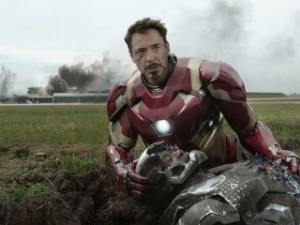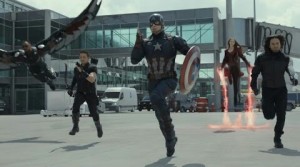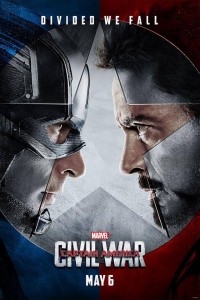Captain America: Civil War
Reviewed by Tony Keen 13-Jun-16
Captain America: Civil War could have been a mess, but in the event, though there are flaws, it’s a well-made and entertaining piece.
Yes, there will probably be some form of spoilers below.
One of the problems with many of the Phase 2 movies of the Marvel Cinematic Universe was that they failed to effectively engage with the fact that the characters were now in a larger megatext than just their own individual movies. Questions were inevitably asked, such as why doesn’t SHIELD take an interest in attacks on Tony Stark? Why doesn’t Thor call in the Avengers to help against Malekith? Why doesn’t Iron Man rush to Washington once he sees on the news that Cap’s in trouble? True, there is a tradition in the comics of solo adventures outside the team framework, but such adventures tend to be on a smaller and more personal scale than what happens in the pages of Avengers. The MCU movies are all blockbusters, with correspondingly high stakes. Iron Man 3, Thor: The Dark World and Captain America: The Winter Soldier all reference the events of The Avengers, but don’t seem to want to face the consequences of that movie for the sort of tale they want to tell.
Captain America: Civil War isn’t like that at all. It addresses head on the fact that Cap is now the leader of the Avengers, which also includes his new best friend the Falcon. In one respect, it is indeed effectively an Avengers movie, albeit one that focuses in particular on Cap and Tony Stark. There are those that have argued that, much as Winter Soldier was seen by some as more of a Black Widow movie than a Cap one, so this is more of an Iron Man vehicle than one for Steve Rogers. I don’t think that’s entirely true – and indeed a rewatch of Winter Soldier brings out more clearly Cap’s importance to the story. Civil War may be an Avengers movie, but it’s one which places Cap firmly at its emotional heart (as he often has been in the comics). And yes, there’s a lot of Tony Stark, and a lot of other people, but you do get the impression that Robert Downey, Jr, knows he’s in someone else’s movie, and plays accordingly. If Chris Evans gets overlooked in this movie and Winter Solider, it’s often because his thoughtful performance as Cap – light years away from his Johnny Storm – can be overshadowed by his flashier co-stars. But that thoughtfulness anchors the movie, and allows the creators to get away with quite a lot. Moreover, the Russo brothers and Christopher Markus and Stephen McFeely do quite a deft job of herding their large cast, so that no-one really seems like they have little to do, apart from Martin Freeman’s Elliott Ross, who is presumably being trailled for the Black Panther movie. (Though we certainly could have done with more of Emily Vancamp’s Sharon Carter.)
Fans expecting the movie to follow closely Mark Millar’s Civil War will be disappointed, and probably weren’t paying close attention to Age of Ultron – Civil War borrows more from its namesake than the second Avengers movie, but also draws from many other sources to produce its own story. Indeed, it would be impossible to pick up everything from Millar’s work, due to differences between the Marvel Universe of Earth-616 and the Marvel Cinematic Universe – for instance, a major part of the comics story was the revelation of secret identities, something that the MCU has almost completely dispensed with, though evidently Spider-Man: Homecoming will bring the concept back. For some reason, though, this movie has seem more than its fair share of “but that didn’t happen in the comics” in comparison with most MCU movies. I conclude that for some fans, Civil War is a very dear narrative. (For others, of course, the comic is considerably less appealing, and they may be pleasantly surprised by the movie. Or they may not, for reasons I’ll go into below.)
 The movie does borrow from the comic the idea that the conflict begins with a disagreement between Tony Stark and Steve Rogers, with Stark motivated by guilt over the deaths of innocent bystanders while the Avengers were doing their thing. However, where the comic tries to be very balanced, the movie is well aware that it is Captain America: Civil War, and it must be on Cap’s side. Which is a bit of a problem, as Iron Man has a very strong argument, that some form of oversight for the Avengers is necessary. It’s true that the Sokovia accords are presented to Cap and the Avengers by Stark and Thunderbolt Ross, now the Secretary of State, as a fait accompli, rather than asking for their opinions first, and Cap’s right that only being able to act when a UN panel tells them to will hamstring the Avengers’ ability to help people. But these are surely minor points that could be negotiated, and it seems odd to see the Cap who brought down SHIELD because it was unaccountable so categorically rejects oversight of his own activities. (In the comic, of course, a lot of the issue was government intrusion into heroes’ secret identities, which is, as noted, moot in the MCU.) The movie tries to dress Cap’s rejection up as his dedication to “freedom”, but this is the worst kind of American freedom, the freedom to act without any consideration for the effect of one’s actions upon others. Up to now the MCU Cap has been about freedom and responsibility, but the latter is only paid lip-service here. It’s as if in the MCU a Steve Englehart/Ed Brubaker Cap has been replaced by the Cap of Jack Kirby’s 1970s run, or Mark Millar’s from The Ultimates. It’s a tribute to the creators, and to Evans’ performance, that the movie almost brings liberal Cap fans round to accepting that he’s right.
The movie does borrow from the comic the idea that the conflict begins with a disagreement between Tony Stark and Steve Rogers, with Stark motivated by guilt over the deaths of innocent bystanders while the Avengers were doing their thing. However, where the comic tries to be very balanced, the movie is well aware that it is Captain America: Civil War, and it must be on Cap’s side. Which is a bit of a problem, as Iron Man has a very strong argument, that some form of oversight for the Avengers is necessary. It’s true that the Sokovia accords are presented to Cap and the Avengers by Stark and Thunderbolt Ross, now the Secretary of State, as a fait accompli, rather than asking for their opinions first, and Cap’s right that only being able to act when a UN panel tells them to will hamstring the Avengers’ ability to help people. But these are surely minor points that could be negotiated, and it seems odd to see the Cap who brought down SHIELD because it was unaccountable so categorically rejects oversight of his own activities. (In the comic, of course, a lot of the issue was government intrusion into heroes’ secret identities, which is, as noted, moot in the MCU.) The movie tries to dress Cap’s rejection up as his dedication to “freedom”, but this is the worst kind of American freedom, the freedom to act without any consideration for the effect of one’s actions upon others. Up to now the MCU Cap has been about freedom and responsibility, but the latter is only paid lip-service here. It’s as if in the MCU a Steve Englehart/Ed Brubaker Cap has been replaced by the Cap of Jack Kirby’s 1970s run, or Mark Millar’s from The Ultimates. It’s a tribute to the creators, and to Evans’ performance, that the movie almost brings liberal Cap fans round to accepting that he’s right.
But actually, the arguments and fights are not really about the politics – they’re about personal relations, in particular Steve’s relationship with and loyalty to Bucky, and the deterioration of his friendship with Tony Stark, as it becomes obvious that the Winter Solder really was responsible for something that we’ve suspected he was responsible for since the previous Captain America movie. Many other characters’ motivations are personal; the Black Panther, played with considerable grace by Chadwick Boseman, is motivated by loyalty to his dead father.
Many other character moments are handled well. The Winter Soldier and the Falcon spikily negotiate their rivalry for being Cap’s best bud. We get probably the most subtle portrait ever of Helmut Zemo as the antagonist behind it all. And we finally in this movie see what Marvel fans have wanted to see for ages, the importance of the Steve Rogers/Clint Barton relationship to the Avengers, where Cap calls and Hawkeye comes running. Meanwhile, the Vision attempts to start up a relationship with Wanda in a wholly hamfisted manner. And Paul Rudd’s Ant-Man returns for a fan-pleasing moment.
 There are so many costumed characters in this movie that it could turn into an unholy mess. The movie dashes off at multiple tangents, busy setting up at least two, if not three, further movies. On which subject, the other new hero here, Tom Holland’s Spider-Man, may not quite have the gravitas of Tobey Maguire or Andrew Garfield, but a good job is done of picking up on the Stark/Parker relationship as seen in the Ultimate Spider-Man cartoon series, where Spidey is an annoying little fanboy who tests Stark’s patience. And there’s a good joke about Spidey talking in fight scenes.
There are so many costumed characters in this movie that it could turn into an unholy mess. The movie dashes off at multiple tangents, busy setting up at least two, if not three, further movies. On which subject, the other new hero here, Tom Holland’s Spider-Man, may not quite have the gravitas of Tobey Maguire or Andrew Garfield, but a good job is done of picking up on the Stark/Parker relationship as seen in the Ultimate Spider-Man cartoon series, where Spidey is an annoying little fanboy who tests Stark’s patience. And there’s a good joke about Spidey talking in fight scenes.
Certainly, if you don’t like superhero movies, then the big multi-hero fight scene will annoy you immensely. On the other hand, if you like the big multi-hero battles that the comics have been providing since the 1960s, then you’ll like this movie. It’s well-constructed and entertaining. And it’s not a mess. It also solves, for the rest of the Phase III movies, the question that I started this piece with – why don’t the Avengers get involved?
The Marvel movies have still not jumped the shark yet, despite the last three movies worryingly seeming as if they might. Let’s see if they can keep this up with Doctor Strange.
Tags: Anthony Russo, Avengers, Captain America, Captain America: Civil War, Chris Evans, Christopher Markus, Iron Man, Joe Russo, Marvel Cinematic Universe, Marvel Studios, Robert Downey Jr, Stephen McFeely